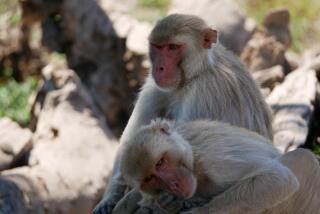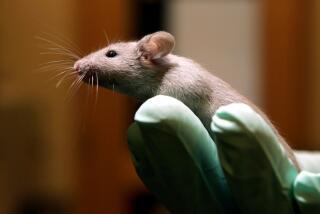SCIENCE / MEDICINE : No Monkey Business for Mouse, Experts Find : Behavior: The species under study is monogamous, researchers say. What’s more, a chemical in the female’s urine makes the males baby-sit the offspring.
- Share via
BERKELEY — Sure there are lots of faithful husbands out there, and many, no doubt, who take care of the kids to boot. But here in California (yes another trend is being set) there are some female mice who apparently have found a way to ensure this type of zealous paternalism in their mates.
Two scientists have identified a species of monogamous mouse native to California in which the female produces a chemical in her urine that induces the male to take care of the babies.
This is among the findings made by UC Berkeley field biologist David Ribble and David Gubernick, assistant professor of psychology at the University of Wisconsin in Madison, who are studying the California mouse, Peromyscus californicus.
From field observations over the past 40 years, scientists have suspected that the California mouse was monogamous. “It’s extremely rare in mammals as a whole,” said Ribble. Although monogamy is common in bird species--perhaps as high as 60% to 70%--the best estimates are that only 3% to 10% of mammals mate exclusively with one of their own species.
But it was just this spring that Ribble, a doctoral student who does his research at UC Berkeley’s Museum of Vertebrate Zoology, used a technique new to field biology--genetic fingerprinting--to demonstrate conclusively the exclusive relationships between male and female California mice. The data backed up field observations he had made in 1987.
To carry out the genetic testing, he anesthetized trapped mice and snipped off a tiny tip of their tails to extract the required DNA. In testing 98 offspring from 27 families, he found that their DNA matched the DNA from their parents. “It turns out they’re as monogamous as they can be,” said Ribble.
From his observations during the field studies, he also found that males spend as much time caring for the young as females do. By putting tiny plastic collars with radio transmitters around the necks of several male and female mice, he tracked their position for several days before removing the collars. He found that they spent equal amounts of time in the nest.
When looking at what kept the parents parental, Gubernick stumbled across the physiological basis for male parenting. “It was the presence of the mother that was important to keep the males parental,” he said. More specifically, after much experimentation with exposing males to other female urine and distilled water, he determined that it was a strong chemical signal from the urine of the male’s mate that induced him to take care of the young.
“We’re trying to identify what chemical now,” he said, noting that changes may occur in the mouse brain during parenting.
Gubernick also has probed the mice’s monogamous relationship by investigating pair bonding, mate fidelity and mate choice. When he offered females in their second estrus another male, they preferred their mates. When two virgin females were put in a cage with a male and female that had already bonded, the male would not mate with the virgin females.
Although it is very clear in the laboratory that males spend as much time caring for the young as the females, Ribble and Gubernick have not observed the parenting behavior in the wild.
This summer they plan more field studies to pursue parenting behaviors and try to determine if another unusual laboratory behavior also occurs in the field: that weaned offspring help raise their younger sisters and brothers. Immediately after a female gives birth, she mates again and produces another litter a month later, just after the first litter is weaned. But the first litter stays in the nest for another month before leaving to establish their own nests. During this time, they appear to baby-sit their siblings.
Asked why the California mouse has such a complex social system, Ribble suggested a complex answer: The mouse, which weighs 40 grams, is about twice the size of normal field mice. Usually in mammals the “bigger you are, the smaller the litter size,” he said. And although four offspring can share enough body heat to maintain their body temperature to keep themselves alive, two cannot. So a male contributes to the growth of the young by helping maintain their body heat while the female leaves the nest to eat.
The researchers have discovered other compelling facts about Peromyscus californicus:
* Unlike most mammals, after being weaned from their mothers, virgin females roam into new territory to find a mate, while virgin males stay near the place where they were born to wait for a female to find them.
* After a female selects a mate, she waits, sometimes for several months, before going into estrus to mate, perhaps to see if the male and his territory are suitable for raising offspring.
These studies prompted Gubernick to ask the same questions about human males: Do men undergo hormonal changes when their wives are pregnant and give birth? In a study begun in April, Gubernick is following 25 couples who are participating in Lamaze classes from six weeks before the birth of a child to four weeks after. He expects to analyze the data in January. “If we find something, it will have important implications for paternal bonding,” he said.





